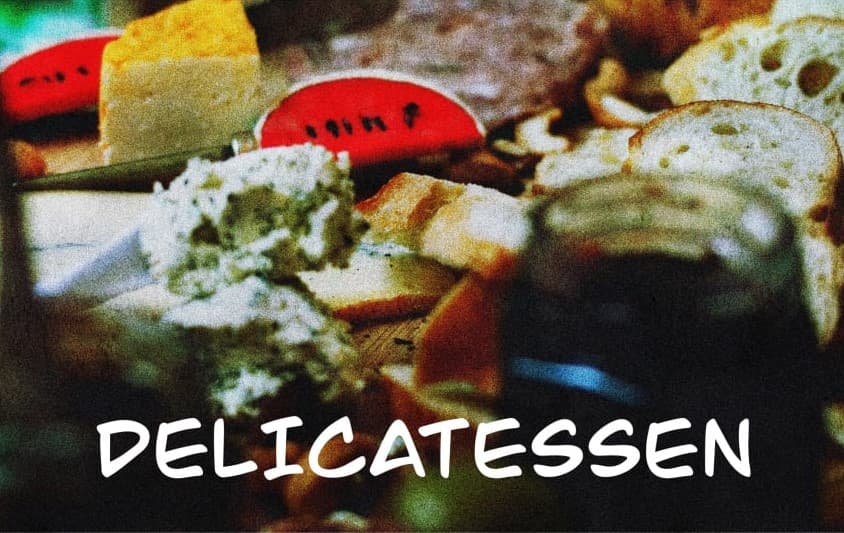I told Ania about my memory of the Barony Street delicatessen in Edinburgh. In 1979, when I had been a postgraduate architect in the city, long before we had met. I used to buy a sandwich there to take into the Minto House studio. The shop was long, running back from the door, and getting darker toward the back. A glass-fronted display cabinet ran the full length of the room. You came in from the street on the left, and to the right behind the long counter was the shopkeeper’s territory. She was a dear old woman who spoke no English. And anyone else I would meet in the shop would also be old, slow, wearing heavy brown clothes. They would speak no English. I think they usually carried Polish newspapers. Perhaps that last detail is just an invention of memory.
I would point at whatever I wanted her to put in the sandwiches, and she would take a large breadknife and carve slices from a big soft crusty loaf. She would then make them up on the countertop behind the display case with butter, and slices that she would carve with a sharp knife from one of the dried hams or sausages hanging from the high dark ceiling, or with pieces from one of those big delicious hard cheeses in the glass-fronted case. The exercise was unhurried. The place was otherwise packed with mysterious things – great jars of blueberries, packages of dried savouries and bottles of pickled cucumbers – some labelled with words containing far too many Cs and Zs for my pronunciation, let alone interpretation.
Further examples of alien craftsmanship, far beyond the borders of my bravery, packed more shelves on the wall behind her. By the seventies, Elizabeth David had shown my food-ignorant nation that weird European things like olive oil and even avocados were edible, but this stuff was way beyond any level of exotic that I had imagined. The sandwiches I took away were always delicious. And more than that, they carried with them an additional intangible mystery representing everything else in the delicatessen. They expressed a dim grey-brown cornucopia of arcane and succulent items, things that I could never order or taste for lack of a shared culture or language. It wasn’t that I was frightened of the ingredients. On the contrary, I was in awe of this place and afraid of making a fool of myself through my cultural ignorance.
Ania heard me out, and then described the scene as it would have been in contemporary communist Poland.
The shopkeeper would have been a coarse woman of about thirty with her hair in a bun. Almost the only thing on the counter would be a telephone of grey or red bakelite, and it was there as a symbol of power; just because she had one. This shop would have been a bleak cold place almost empty of merchandise but with a long queue. You had to queue from three in the morning for a piece of meat. Not good meat. Something you would only have given to an animal in better times, or a piece of sausage, composed of more grain than offal – and containing nothing that you would think of as meat at all.
Long before that, Ania had told me of the Polish tradition of professional queuing. This had been in a time and a place where you might queue for hours for a loaf of bread, and for a few days or a week for a piece of furniture or the chance to buy a television. These queue professionals would stand and shuffle forward for a day or for a few hours, and then they would sell their place, to move to the back again. They wore a recognisable uniform.
But when I asked her about it today, she seemed to have forgotten. Maybe orange socks. And they only did that in the offices for car registration.
Whether the failure of memory is hers, or (almost certainly) mine, I liked that idea. It suited a little movie I could play in my mind, a movie of a suppressed culture that carried my Edinburgh cornucopia in its folk memory. My fantasy was of cultural creativity expressed not in power plays of telephones and empty shelves, but in the invention of a profession created to exploit the particular economic niche of the empty shop.
footnote: I refer to “big delicious hard cheeses here. Don’t know how real that memory was when I wrote this almost ten years ago; the only local cheeses I have discovered since moving to southern Poland have been small soft salty, and best when grilled. Having said that, according to Wikipedia there are a couple of larger harder cheeses so maybe . . .

